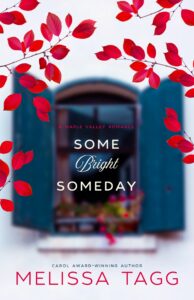by Melissa Tagg, @Melissa_Tagg
Something a little crazy happened last year.
Or a LOT crazy.
I wrote a full-length novel (we’re talking 98,000 words by the time all was said and done) in two weeks.
Or more accurately, eleven days.
When I was trying to think of an idea for this blog post, a helpful friend suggested I write about that process of writing a novel in two weeks. Which sounds like a great idea for a blog post until I remember that in order to be fully honest, I have to go back to what happened before those two weeks.
And what happened before was months and months of frustration. And discouragement. And lack of creative energy. I’ve honestly never experienced anything like that before. But I can tell you this: Never again will I be one of those stern authors who tells people you can write through anything, just put your butt in the chair, there’s no such thing as writer’s block, etc., etc., etc.
I mean, sure, sometimes you have to do what you have to do. I.E. Deadlines are real and they aren’t often patient enough for inspiration.
But other times, your body, your brain, your soul are all trying to tell you something—and you need to listen. And no amount of stubborn, dogged determination is going to dredge up what you’re too emptied out to find.
And that was the truth of my January-August 2020 for a variety of reasons.
Until September. When a whole story poured out of me in a slew of joyful writing days. I’d love to give you some neat and tidy tips for what I did to make that happen. But truthfully, I don’t believe I did make it happen. I believe that book was the direct result of prayer!
However, I can tell you some of the things that definitely helped during those two weeks:
- Change your place in order to change your pace. During that two-week writing sprint, I spent the first week at an Airbnb cabin—at a goat farm, actually. And it was amazing. Being somewhere new, being somewhere alone, being somewhere pretty helped me pick up my pace to a surprising degree. I was writing around 10,000-11,000 words each day and that never happens in my normal environment!
- No wi-fi. Let’s say it again—no-wi-fi! The cabin where I stayed had no internet and very limited cell service which meant no social media, no emails, no voxing, nothing. Sure, it made me a little twitchy at first, but it ended up being one of the most mentally and creatively freeing stretches of time I’ve experienced since I began writing.

- Plan and even prep your meals. Going into that two weeks, I knew I didn’t want to spend time on anything I didn’t need to. So I prepped my meals in advance. I made a huge pot full of healthy taco soup, cut up veggies for salads, and packed easy things like yogurt, granola and fruit. (If I suddenly sound super healthy, don’t worry. At the end of it all, I rewarded myself with pizza!)
- Do your character work in advance. Whether you’re a plotter or a pantser, if you’re trying to sprint your way through a book, it’s important to know your characters in advance. I recommend Susan May Warren’s SEQ. In my case, I was well-acquainted with my characters after having spent eight months attempting to write about them!
- Celebrate each night—in ways that don’t overload your brain. Every night of that writing binge, I celebrated with a bubble bath and a Hallmark movie. I’m not even a huge Hallmark movie fan, but I knew I wanted to watch something light—nothing that would settle too heavily or deeply in my brain. Everybody’s brain works differently, but I simply wanted to keep mine pretty un-jumbled. I was done writing each night by seven or seven-thirty and those easy evenings of unwinding followed by a full night of sleep made such a difference!
- Journal and pray. I’m a big “morning quiet time” person. It’s my favorite time of day and sets the tone for everything to come. And I experienced that even more fully during my two weeks of writing. Each morning I would journal about the day before and get excited about the day to come. I prayed over my scenes and my characters. I reminded myself why I tell stories.
That time of quiet contemplation enriched and revived me—and, I truly believe, was the whole point in those two weeks. Was it wonderful to come away from that time with a full-length novel to show for it? Sure. But the “coming alive” feeling I experienced was the very best part.
A lot of these points can be adapted to your situation. Maybe it’s not feasible to take two weeks off work and go to a goat farm. But could you find a new place to write? Maybe even just a new spot in your house?
Maybe making meals during writing days isn’t a chore to you, but something else is. What can you do beforehand to make your life easier when you’re writing? Maybe you’re not a big journal-er…what about taking a morning walk?
For the record, I don’t think every book is meant to be written in two weeks! But if you decide to give it a try sometime, hopefully some of these notes will help. And if you come up with tips of your own, I’d love to hear them.
Lucas Danby has always regretted the end of his Army career— and he’s never stopped trying to redeem his honor. He’s spent the past decade as an elite private soldier, but the high-risk work never cures his shame. Now he’s stuck stateside, mentoring a new recruit. Worse, he’s sick of lying to the people he cares about most—including the woman he’s secretly loved for years.
Jenessa Belville is the last Belville left—and if she had her way, she’d leave the name and all its painful memories behind. Which is exactly what she hopes to do once she sells Belville Park, the massive estate she inherited from her parents. But on the same day she puts up the “For Sale” sign, she discovers three children hiding in the caretaker’s cottage.
Struggling to mentor a young man with scars nearly as piercing as his own, Lucas offers to help Jenessa restore the Belville grounds. Though drawn together by a trio of kids who tug on their hearts, past secrets and current sorrows threaten to pull them apart. Only the brightest love and hardest sacrifice can turn the house Jenessa never wanted into the home she and Lucas have always longed for.

Melissa Tagg is the Christy and Carol Award-winning author of swoony and hope-filled small-town contemporary romances, including the Maple Valley series, the Walker Family series, the Where Love Begins series, and the Enchanted Christmas Collection. She’s also a former reporter, current nonprofit marketing strategist, and total Iowa girl. Melissa has taught at multiple national writing conferences, as well as workshops and women’s retreats. When she’s not happily lost in someone else’s book or plugging away her own, she can be found spoiling her nieces and nephews, watching old movies, and daydreaming about her next fictional hero. Connect with Melissa at melissatagg.com.


